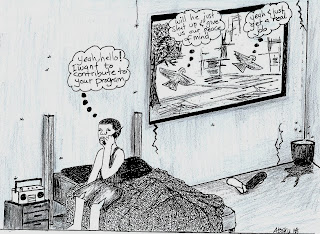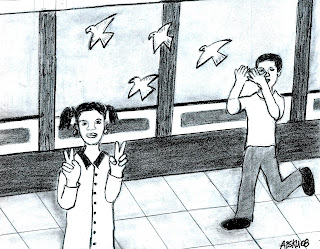
I’m fascinated by the hot unguarded phone calls on radio stations preceding the December 7 elections so I went traditional – to “see the Old Lady.” In the chief’s courtyard, when the elders are stuck with decision-making and need to access real wisdom, they go behind to consult the Old Lady. Today, I report to you the wise commonsense-based wisdom the Old Lady shared with me. She lamented about her disgust and unhappiness regarding the free flow of testosterone throughout this land, especially on radio stations. Ours is a young democracy that must be protected.
Testosterone is a libido hormone. Men have it more than women. Hold your breadth. I’m woman enough to make this statement – It’s a man’s world! The men of Ghana are responsible for the current flaming of passions in the media. Granted, there are a few women who also freely let go of hot-bed estrogen and testosterone. If you are in doubt of my assertion, please try this exercise for a few days. Tune in to radio discussion programmes and call-in shows from sun-up to sun-down. You would hear mostly men yelling and screaming hoarse about one topic or the other, endangering their hernias.
A super-charged combination of poisonous testosterone and unrestrained free speech on FM stations is dangerous. Two key outcomes of our development and democratic enterprise are the diffusion of radio stations and mobile telephony. Current figures obtained of privately-owned FM stations in Ghana are 166. The regional spread is as follows: The Ashanti Region tops the list with 38, followed by the Western Region (26) and Greater Accra (25). Brong Ahafo has 22, Central (15), Eastern (14), Northern (11), Volta (7), Upper West (4) and Upper East (4). So clearly, some regions are doing a whole lot of talking into the airwaves than others. The Volta and the two upper regions (East and West) are not running their mouths as much.
Technology, especially the mobile phone, is a major tool that facilitates the rapid run of restless mouths from dusk to dawn. Give Homo sapiens the freedom to speak with unguarded adrenalin rush, and throw in ICT (Information Communication Technology) innovations and what you could potentially end up with are flagrant abuses.
Times past, we had drums and gong-gong beaters who went through towns and villages to make announcements and disseminate messages. Those traditional drums have now been muffled, their places and roles taken over by the pervasive modern-day gong-gong – the mass media. The electronic media of television is more passive but radio is king.
The mass media is an agenda-setter. Callers to FM call-in shows, by default, contribute in setting our agenda in as much as they also put some opinions out there. Democracy benefits, in the final analysis. But telephone companies benefit immensely, immediately. While our radio stations get on heat with phone calls and text messages, those at the receiving end of the talking business thrive. For some callers, it is an addiction. Even when they are broke, they still find money for phone cards. Call it misplaced priority but it is gratifying to them.
Regarding the morning shows, I’ve imagined the state in which some people are when making calls. My guess is that some callers wake up, fresh, with their mouths and faces unwashed and call when stricken by a subject matter under discussion on a radio station. You can tell by listening to some callers that their voices still have that leathery feel of not fully woken up. So with stinky mouths and sleep-cracked faces, and without checking themselves, they arrive on air, and by that, in our homes and in our consciousness – to speak their unprocessed and not fully thought-through ideas. They drop these on us in the name of blessed free speech.
There are various types of callers to FM stations. Some are invited to share their expertise or respond/react to specific issues. And then, there are callers from the rank and file who just call because they too must be heard. Speaking in either English or local languages, they appear to love the experience of putting their voices out there for a feeling of satisfaction and bloated ego. These callers provide pure entertainment money cannot buy. But they are scary too. Following are descriptions of a few types of callers.
1). The Gentleman Caller (GC) starts off in a gentlemanly manner – so composed like he can’t hurt a fly. He calmly announces, “I want to contribute to your programme.” Unsuspectingly, the presenter gladly accepts and welcomes his call. Like a train, GC typically begins in low tones. But suddenly, without warning, his voice begins to crank up to a high pitch, adopting a goat-like voice. When GC arrives at this stage, he shuts off from hearing the presenter because he is in a zone and can only hear himself. At that point, if the radio presenter doesn’t cut GC off, he could slide into the gutters and may insult anything that crosses his tender mind because he is doing only one thing: speaking his mind. Afterwards, he would walk away knowing that he has just made a big fool of himself but feels good anyway.
2) The Angry Caller (AC) is already charged, temper frayed, fully warmed up before making the call. Typically, his radio is on, very loud in the background. Some of these callers are so full of hatred you couldn’t cut through the hatred with the sharpest blade. AC is like a corn-mill that grinds without getting tired. As soon as the presenter says, “You are on air. Please turn your radio off,” AC takes off grinding coarse corn, spewing out hot anger. Without apology, he is usually angry about a particular subject matter. He appears to be sponsored, with calling cards paid for by sponsoring organizations with unending re-fill privileges. After the call, he smiles with the full satisfaction that he has let off steam onto opponents, the direct target of the call. He changes the radio dial to another station to make yet another call.
3). The Clueless Caller (CL) wakes up early to do the radio rounds. He is fully armed with cell phone units. He usually has nothing of substance to say to Ghana or to himself but must call anyway. When the phone line connects, he pauses to clear his throat and asks the presenter, “Ehhm, what is the topic about? I want to make a submission.” Then he might stammer his way through, talking nothing but pure trash. Afterwards, he goes away, content and grinning with erect ears.
Some of these callers sound as if they’re just about to burst their hernias. As you listen, you can tell that something within the caller is shifting position and possibly, about to burst or drop out of him. Oh democracy, thou art great!
All these radio callers might sound annoying to our ears every morning. But on the brighter side, such annoyances are better than guns. Foul mouths, wagging tongues and ear-splitting voices are preferable to gun shots and stray bullets, if we can keep it that way forever without fists. So long as we are talking, even if we are talking shrill and hoarse, talking is still much better than guns. With talking, we will live to see another day. But with guns – well, don’t even imagine guns instead of hot talk. Tofiakwa!
+233-208286817; dorisdartey@yahoo.com;
